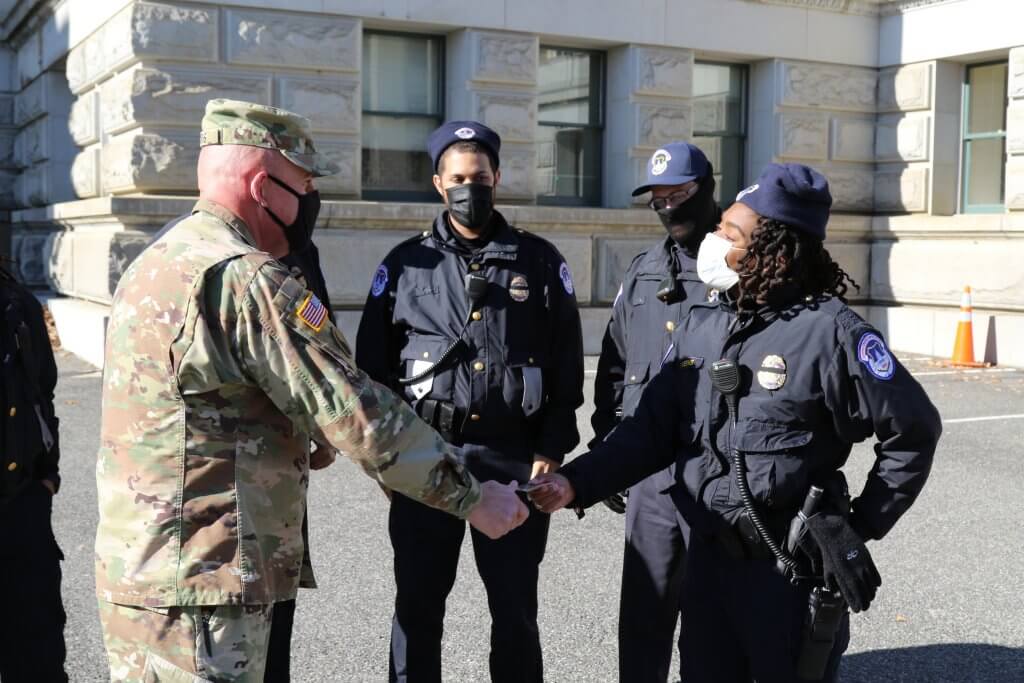The National Guard Bureau announced Monday that it has received inaugural support requests from the Secret Service, Capitol Police, and Park Police. Roughly 6,200 soldiers and airmen from six states and the District of Columbia are on the ground in the National Capitol Region supporting civilian authorities, according to Gen. Daniel Hokanson, Chief of the National Guard Bureau. The Pentagon has authorized up to 15,000 Guard members for current and future inauguration support requirements.
Hokanson adds that the National Guard has long played a role in the nation’s inaugural events.
“In case you are not already aware, the National Guard has a long and proud history of inauguration support and the forefathers of today’s National Guard were present for the Inauguration of George Washington, and we have been part of every inauguration since,” Hokanson said in a released statement.
The first time Senior Master Sgt. Craig Clapper helped with preparations for a presidential inauguration, the nation was gripped by a recession and had elected its first Black president.
Twelve years later, Clapper, who serves with the D.C. National Guard, is involved with his fourth inauguration, this one ushering the oldest American president ever into office.
“They have been fantastic experiences,’’ said Clapper, 43. “Each one has been different. When President Obama was first elected, the crowds were enormous, and it was a historical experience nationwide. It has been a good experience to be a part of all of them.’’
With the country battling the COVID-19 pandemic, different does not begin to describe what will occur on Wednesday, Jan. 20, 2021. The 59th presidential inauguration will occur on the west front of the U.S. Capitol, where Joe Biden, the 78-year-old former vice president during Barack Obama’s two terms, will succeed Donald Trump as the 46th president.
The National Guard supports the inauguration in three key areas, Clapper said: crowd management, traffic control, and security. That support is provided to agencies that include the Metropolitan Police Department of D.C. (MPD), National Park Service, U.S. Secret Service, and the D.C. Homeland Security and Emergency Management Agency (HSEMA).
“We have not, in the past, provided support [for] riot control,’’ said Clapper, adding that the MPD will swear in National Guard members as special police for the occasion. “That actually has not been our mission. However, we’ve always been prepared if something like that were to happen.’’
During a typical inauguration, the D.C. National Guard and units from various states and U.S. territories provide 5,000 to 7,000 soldiers and airmen. This time, that number is expected to double.
“We’re all expecting a smaller inauguration, but nothing official has come out from the inauguration committee yet.’’ (The Presidential Inaugural Committee recently announced health protocols for the event and urged the public to enjoy the festivities from home.)
The inauguration, with about 70–80% of the unit’s members filling some role related to the inauguration, will cap an unusually busy stretch for the D.C. National Guard. Besides pandemic support, the group responded to civil disturbances after the death of George Floyd in May, supported Fourth of July operations, and was involved with the 57th anniversary of the March on Washington in August.
“The inauguration is just an upscale event of what we normally do,’’ Clapper said.
Training sessions for those missions have helped the Guard in preparations for the inauguration, Clapper said. Many meetings and drills have been virtual but not everything.
The General Services Administration’s delay in certifying the election results did not affect the Guard’s preparations, Clapper said. The Electoral College officially made Biden the president-elect on Dec. 14, 2020.
Since an honor detail rode with George Washington as he took the oath of office in New York City in 1789, the D.C. National Guard has been present at every presidential inauguration. It began its support role with the 1860 inauguration of Abraham Lincoln.
“Just being down there and being a part of these events, you don’t get that experience anywhere else,’’ Clapper said.
The D.C. National Guard was there when Harry Truman’s swearing-in ceremony was the first to be televised in 1949. It bore witness to John F. Kennedy’s famous words at his 1961 inauguration: “Ask not what your country can do for you—ask what you can do for your country.” And it was on the scene when Bill Clinton’s second inaugural was the first to be broadcast live on the internet in 1997.
Those were special events. Clapper, who has 23 years of military experience, does not expect Biden’s inauguration to be any different despite the unique circumstances surrounding it.
“We’re prepared,’’ Clapper said. “We’ve done this before and I [am] hopeful for a peaceful transition of power because that makes our life easier. It makes everyone’s life easier.’’
EDITOR’S NOTE: Senior Master Sgt. Clapper’s interview was held prior to the Capitol riot on Jan. 6, 2021.

